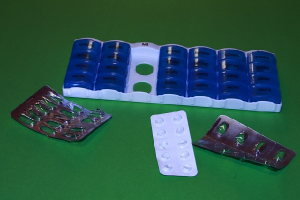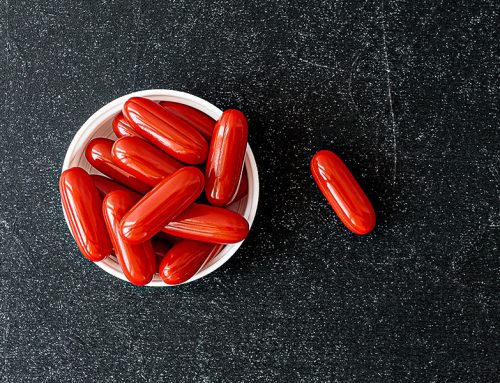
Which one is the logical choice?
Ubiquinone or Ubiquinol?
Coenzyme Q10 comes in two different forms: the oxidized form called ubiquinone and the reduced form called ubiquinol. What do the terms oxidized and reduced mean? Basically, they are terms from chemistry. The oxidized form is the Q10 molecule that has donated electrons. The reduced form is the Q10 molecule that has accepted electrons. Together, the two forms make up a redox pair, and the point about a redox pair is that the body converts the two forms back and forth.
Lately, there has been a lot of advertising hype for the ubiquinol form of Q10. On the Web, there have been undocumented claims that, after the age of 40, we might have more difficulty converting the ubiquinone molecule to the ubiquinol molecule in our bodies.
Misleading information about ubiquinol
I am finding it difficult to follow the logic of such claims for ubiquinol. We know that the body converts the Q10 molecules back and forth between the ubiquinone form (the form needed for energy production in the cells) and the ubiquinol form (the form needed for antioxidant protection).
Each Q10 molecule is like a light switch
In the human body, the Q10 molecules are oxidized and reduced repeatedly and are thus transformed back and forth multiple times. Each Q10 molecule is switched back and forth in the body in just the same way that a light switch is turned on and off, you could say.
Whichever form you take as a supplement to your diet, each Q10 molecule will change its form many times in the body before it wears out.
Q10 as ubiquinol
The ubiquinol form of Q10 is a milky white substance as opposed to ubiquinone, which is a yellow substance. If you are in doubt as to which form you have, cut the capsule open and check the color. If you cut into a ubiquinol capsule and the liquid inside is yellow, then you know that you have paid extra money for ubiquinol that has already reverted to the ubiquinone form.
The value of ubiquinol
Yes, indeed, in having accepted electrons (i.e. in becoming reduced), ubiquinol does play an important role in regenerating the ubiquinone needed for the production of energy in the cells. Moreover, ubiquinol is itself an important antioxidant in the body. Because ubiquinol has accepted electrons, it has electrons to be taken by unstable free radicals that have an unpaired electron and that would otherwise cause oxidative damage in the cells.
But, remember, if you take an absorbable ubiquinone supplement, your body will be getting Q10 molecules that the body will then be switching to ubiquinol and back to ubiquinone again.
Q10 absorption the key
When taken orally, ubiquinone supplements pass from the stomach to the small intestine as ubiquinone. Ubiquinol, highly unstable and difficult for manufacturers to work with, is converted in the stomach to ubiquinone and then passed to the small intestine.
The most important thing to focus on is how well the Q10 is absorbed in the small intestine. Yes, there are some claims on the Web that a ubiquinol supplement will be absorbed better than a ubiquinone supplement, but … wait a minute … which type of ubiquinone preparation has the ubiquinol preparation been compared with? It is not a fair trial to compare the absorption of ubiquinol with the absorption of ubiquinone in powder form.
Q10, which is crystalline in its raw form, is notoriously difficult for the body to absorb. To make ubiquinone or ubiquinol absorbable, the raw material needs to be processed properly, and it needs to be blended with vegetable oils in a soft-gel capsule that can withstand the damaging effects of exposure to light. This is the sort of ubiquinone formulation that has given good results in clinical trials.
Ubiquinone the well-documented Q10
There is, at present, much more extensive documentation of the absorption, bio-availability, efficacy, and safety of ubiquinone. It was a ubiquinone preparation that demonstrated statistically significant effectiveness when used in the following scientific studies:
- with patients with chronic heart failure in the Q-SYMBIO clinical trial (1)
- with healthy elderly adults in the KiSel-10 clinical trial (2)
- with athletes undergoing strenuous exercise in a Spanish clinical trial (3)
Those statistically significant results would not have been seen if the ubiquinone, in the particular formulation that was used in those clinical trials, had not been well absorbed. Furthermore, that specific preparation, with its patented formulation, has also been designated the reference preparation of the International Coenzyme Q10 Association.
No reason to think that the reduced Q10 form is more active
Having searched the medical journal literature using the Medline database, I cannot see any evidence that ubiquinol is more biologically active than ubiquinone is. Nor can I find any convincing evidence that older people have more trouble making use of ubiquinone than they do making use of ubiquinol. Actually, the Swedish clinical trial with healthy elderly individuals shows statistically significant results from supplementation with ubiquinone and selenium (2).
Dr. Sinatra’s study of Q10 absorption
The American cardiologist Dr. Stephen Sinatra, the founder of the New England Heart Center, was curious about the claims for the ubiquinol form of Q10. So, in 2013, he recruited 12 volunteers to participate in a Q10 absorption study. He measured the participants’ blood serum Q10 levels at the start of the study and at the end of each month of the study.
In the first month, he gave six participants 200 mg of ubiquinone every day, and he gave the other six participants 200 mg of ubiquinol every day. In the second month, the participants got no Q10 supplements at all. Then, in the third month of the study, Dr. Sinatra switched the roles, and, each day, he gave 200 mg of ubiquinol to the first group and 200 mg of ubiquinone to the second group.
At the end of the study, he found that all 12 of the study participants had achieved excellent increases in blood serum Q10 levels and that all of the participants had achieved approximately the same increased blood levels of Q10. He concluded that there was no good reason why he should begin recommending the more expensive and less stable form of Q10, the ubiquinol form.
Q10: So, where do we stand?
Given the proven track record of a ubiquinone preparation with the coenzyme Q10 molecules in an oil-based formulation in a soft-gel capsule and given that the inherently less stable ubiquinol is converted to the ubiquinone form in the stomach anyway, I am concluding that I will stay with the ubiquinone form.
The ubiquinone form is proven in rigorous clinical trials, and the ubiquinone preparation is less expensive because the ubiquinol raw material is more expensive, and the necessary processing of the ubiquinol raw material is more expensive.
Remember, if you are in one of the following categories, Q10 needs to be at the top of your list of the supplements:
- Over the age of 40 – 45 years
- Suffering from chronic heart failure
- Taking statin medication
- Suffering from high blood pressure
- Exercising strenuously
- Needing heart bypass surgery
Sources:
- Mortensen SA et al. The Effect of Coenzyme Q10 on Morbidity and Mortality in Chronic Heart Failure: Results From Q-SYMBIO: A Randomized Double-Blind Trial. Journal of the American College of Cardiology: Heart Failure. 2014;():. doi:10.1016/j.jchf.2014.06.008.
- Alehagen, U., et al. (2013). Cardiovascular mortality and N-terminal-proBNP reduced after combined selenium and coenzyme Q10 supplementation: a 5-year prospective randomized double-blind placebo-controlled trial among elderly Swedish citizens. International Journal of Cardiology, 167(5), 1860-1866.
- Díaz-Castro J. et al. Coenzyme Q(10) supplementation ameliorates inflammatory signaling and oxidative stress associated with strenuous exercise. European Journal of Nutrition. October 2012;51(7):791-799.









Above it says “cut the capsule open and check the color. If you cut into a ubiquinol capsule and the liquid inside is yellow, then you know that you have paid extra money for ubiquinol that has already reverted to the ubiquinone form.”
I have a bottle Solgar ubiquinol capsules which I opened several months ago. When I cut one open today, it was milky but also yellow. I guess this means the ubiquinol is converting to ubiqinone as you descibe. Does this conversion only happen after the bottle has been opened or, assuming the bottle is within the expiry date, has it started to occur to any significant degree in a sealed bottle?
Hello, Ali,
Dr. Judy tells me that the ubiquinol, which is quite unstable by nature, is difficult to get into the capsules without at least some of its becoming oxidized. It has not been unusual for Dr. Judy to find oxidized Coenzyme Q10 in ubiquinol capsules.
It seems that people buy ubiquinol capsules primarily for one of two reasons: 1) they have accepted uncritically the marketing claims that ubiquinol is absorbed better than ubiquinone (not at all proven at this writing) or 2) they think that they need to take ubiquinol because the Coenzyme Q10 in the blood is predominantly in the reduced form. But the Coenzyme Q10 in both ubiquinone and ubiquinol capsules will be absorbed as ubiquinone in the small intestine and then converted to ubiquinol in the lymph.
Neither of the two reasons that I have listed above makes sense to me. There is only one producer of the ubiquinol raw material in the world today. There are a few competitors producing the ubiquinone raw material. Accordingly, the cost of the ubiquinol raw material is considerably higher on the world market than the cost of the ubiquinone raw material. And ubiquinol products are being marketed hard in the United States in these days (withut adequate documentation of solid research). It is a curious situation.
Thank you for your question, Ali. It provokes some thinking, you can see.
Richard
hi,
do u know on dr.stephen sinatra informal 12-person study about CoQ10. ubiquinol and ubiquinone ,which age range was those 12 persons?
thanks
Hi,
I recall reading that the age of the study participants ranged from in their 20 to in their 60s.
http://www.q-symbio.com/ubiquinone-or-ubiquinol
Richard